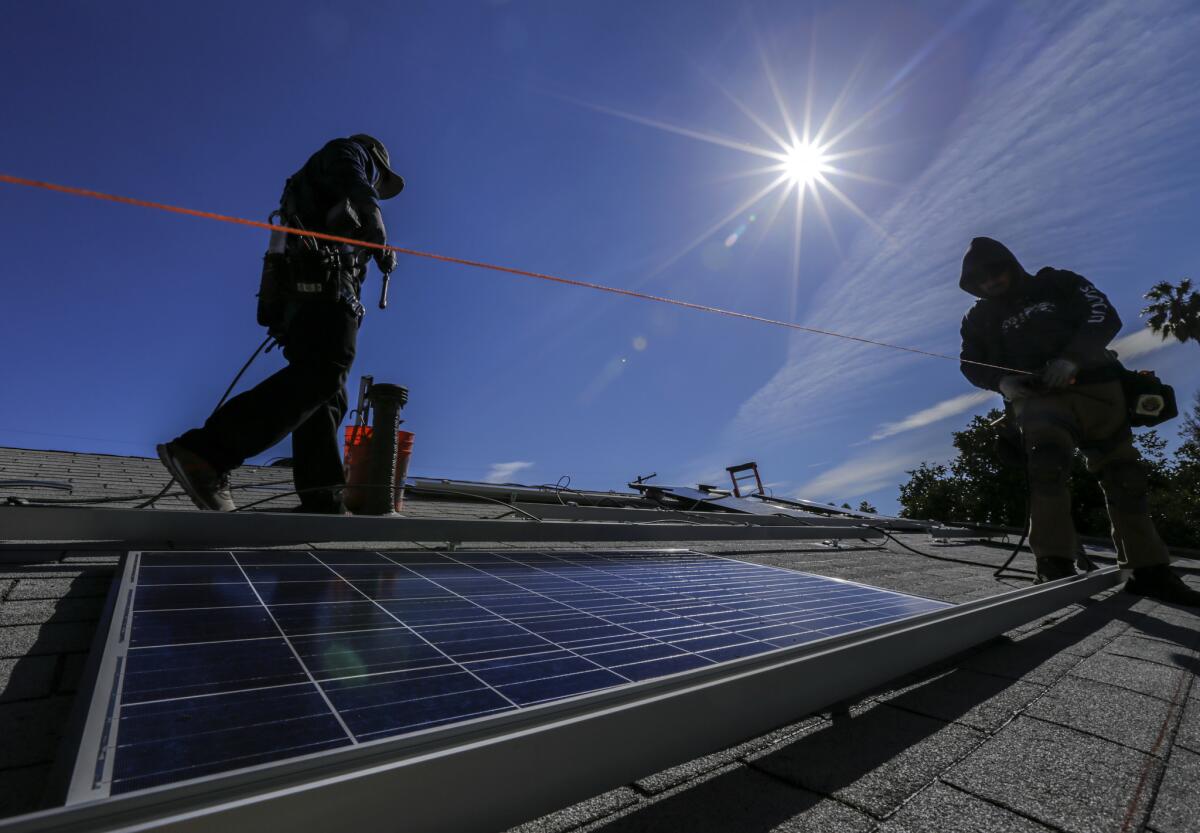Opinion: Solar powering your home? An accountant and an economist weigh in

A crew from Sunrun home solar company installs solar panels on a home in Van Nuys.
- Share via
This past year, our family’s combined monthly electric and gas utility bill hit $500 for the first time. It wouldn’t be the last. In fact, even though we use roughly the same amount of energy we always have — perhaps even less — exorbitant energy costs appear to be the new normal for us.
This realization put us over the edge. Our utility bills had been rising since we moved into our two-story, four-bedroom Bay Area home a quarter century ago. In response, we had been gradually upgrading the energy efficiency of our home and signing up for dynamic pricing programs that charge more when the power system is stressed and less when it has ample capacity.
Join the conversation on Facebook >>
But $500 represented a tipping point. Drastic action was needed.
A scientist we spoke with at the Berkeley Lab, a research facility specializing in energy and environmental solutions, advised us to continue making improvements in energy efficiency to our home, in addition to installing rooftop solar panels.
Economics, however, as many of you know, is the science of using limited resources to meet unlimited wants. Completely greening our house was not in the financial cards.
Forced to choose, solar certainly had several advantages over enhanced efficiency.
First, if we bought the solar panels, we would get a 30% tax credit on our federal returns. Not too shabby.
Second, we would get the benefit of California’s net energy metering, or NEM, program, under which we would be compensated at the full retail rate for electricity for any power we exported to the grid.
Third, if we leased the panels, as a friend told us over dinner, “You have nothing to lose. You put no cash down. And you are guaranteed lower bills for the life of the lease.” The following evening, we listened to another friend proudly boast that his home solar array was helping to displace the world’s dirty power.
Who doesn’t value clean air? And is there a better way to transmit your commitment to the planet than to put a solar array on your roof?
After careful analysis, however, we decided to go with energy efficiency.
Our decision-making process was methodical. It began with what’s called a “blower door test” to determine the amount of duct leakage in our house. This test revealed that more than half of our conditioned air was being wasted. To fix the problem we replaced our central air conditioner and gas furnace — which had been installed in 2003 — with super high-efficiency models. We also installed a smart thermostat, sealed the air ducts, doubled the insulation in the attic, put in a high-efficiency attic fan and installed an insert in the gas fireplace that reduces the amount of cooling or heating lost through the chimney.
Why did we do all this instead of going solar?
To start, we are empty-nesters. The last thing we want to do at this stage of our lives is to enter into a long-term lease.
Of course, we could have just bought the solar panels. For the money we put into upgrading the energy efficiency of our dwelling, we could have bought a 5 kW solar panel system. Our utility bills probably would have been lower and the investment would have paid off in five years.
Ultimately, however, that argument did not persuade us. We believe that the cleanest kilowatt-hour of electricity is the one not-consumed. The next cleanest is the one that is produced from a renewable source.
Production, installation and maintenance of solar panels, after all, requires energy and natural resources. Installing solar and continuing to consume the same amount of energy as we do now would have meant locking in our waste for the next 20 years — with the attendant environmental consequences.
In the end, for us, consuming less energy trumps the ability to produce more — regardless of the source. Using less energy is a better path to environmental responsibility, even if we won’t be able to put a flag up on our roof showing our commitment to the health of the planet.
Ahmad, an energy economist, and Nuzhat, an accountant, live in the San Francisco Bay Area.
Follow the Opinion section on Twitter @latimesopinion and Facebook
More to Read
A cure for the common opinion
Get thought-provoking perspectives with our weekly newsletter.
You may occasionally receive promotional content from the Los Angeles Times.










